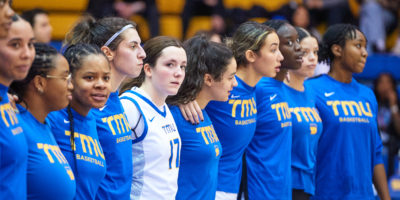By Eli Shupak
For a man who made a living off speaking, the saddest thing Pick’s disease did to Hockey Hall of Fame broadcaster Ted Darling was take away his voice.
The Alzheimer-like degenerative illness prevented the long-time voice of the Buffalo Sabres from truly appreciating hockey’s highest honour back in 1994, when he was presented with the Foster Hewitt award for excellence in hockey broadcasting. He passed away two years later at the age of 61 after a five-year battle with the disease.
Darling, a Kingston native, got a start in his career here in 1955 in the Ryerson Institute of Technology. The 1958 Radio and Television Arts graduate is one of Ryerson’s most famous alumni and will be honoured in the school’s 50th anniversary celebrations this year.
Darling became a starting guard in his first season with the Rams’ men’s basketball team. In 1957, he was named team captain and led Ryerson to the finals of the Metro Downtown Basketball League. Darling was nicknamed “Tiger” by teammate and former Ryersonian editor Al Sokol, for allegedly trying to bite the knuckles of an opponent after Sokol was decked to the floor. Darling was also sports director of a local radio station, CJRT, during his Ryerson days.
From there, he went to Huntsville to work on CKAR’s morning show with a fellow RTA student, before embarking on his dream to become a hockey announcer.
“When he grew up, Foster Hewitt was his hero,” says his son Joel Darling, who graduated from RTA in 1985 and is now the senior executive producer for CBC Sports. “He wanted to follow in Foster’s footsteps and be a broadcaster in the NHL.
“I grew up listening to him, but I never had the dream that he had of wanting to exactly do that. Knowing what he was like in the [broadcast] booth and how good he was, I didn’t have the voice that he had and I knew I never would. He was very good at introducing me to the business and letting me find my own way.”
Ironically, what Joel does now for a living is produce sports programming that is non-hockey related. Quite a contrast from growing up with Canada’s national pastime always in the forefront.
“It was a job I could see he always enjoyed doing,” says Joel, 34, who grew up watching his father broadcast hockey games and sometimes joined him in the booth.
“It didn’t matter to him how many games in a row [the Sabres] had or the fact that he had to take off to another city or go out on a western road swing for two weeks.
“I think it was nice to grow up watching your father really enjoy it and love to go to work. It was probably the best memory I had of him as a broadcaster — just to be able to listen to him whether I was at the games or at home listening in bed. As far as I was concerned growing up, he was always my hero, not only as a father, but just to listen to him on the radio or on television.”
Joel recalls a time in a 1977 game during a Buffalo blizzard as being his dad’s most challenging broadcast. It was one he did from the family’s living room in Lockport, N.Y., north of Buffalo.
“He couldn’t make it to a game in Montreal, so what he decided to do was have somebody do the game on television and he would do it on the radio,” says Joel. “He ended up bringing in a black and white television, instead of doing it off a colour television in the living room. I still don’t understand why he did it.
“He actually called the game off TV. I helped him out and had an earpiece into the TV and I would listen to the broadcaster and give him notes of what the penalties were and who got the goals and assists and the times. A lot of people never even realized he wasn’t at the game. I remember him saying it was the easiest game he ever did because all he did was hang up the phone and went right to bed.”
Joel says this was unheard of at the time, but is quite common nowadays with European broadcasts when networks can’t afford to send somebody over. It was one of the few games Darling didn’t make it to during his 20-plus years with the Sabres. He was with them from their inception in 1970 up until December 1991, when his illness began to affect his work on the air. He insisted on doing the radio broadcast on WGR during the blizzard of ‘77 in order to keep his streak intact for announcing every Sabres game.
Up uitl 1986, he missed only three games because of deaths in the family. His contract with Buffalo stipulated that he had to go wherever the Sabres’ broadcasting rights went. It included 54 TV games plus playoffs, and 26 radio broadcasts over the course of a season. Darling beat out 64 other candidates for the coveted job with his creative broadcast. With the Sabres’ first roster in hand, he rented an Ottawa studio and used tapes crowd noises to complement his simulated broadcast of the club’s first game against Montreal, which they won over Buffalo 1-0.
Before joining the Sabres, Darling did play-by-play for the OHL’s Sudbury Wolves, announced the Ottawa-Hull Canadiens games, and later landed a job with a CBC affiliate, where he worked with sportscaster Dan Kelly. He replaces Kelly as intermission host on Hockey Night in Canada on weekends when Kelly left to do his play-by-play in St. Louis for the Blues.
But it was Darling’s days in Buffalo that got him inducted into the Hockey Hall of Fame.
“I always remember that day as being one of the most difficult days that I ever faced,” recalls Joel. “He wandered off in the afternoon and we didn’t know where he went. Basically all he did was go off for a walk in the underground by the Royal York and came back when he wanted to.
“I actually spoke for him that night and that was pretty difficult, but it was also very rewarding because for me to be up there with him on a night his career was being celebrated and winning an award [named] after his hero was pretty special for me.”









Leave a Reply